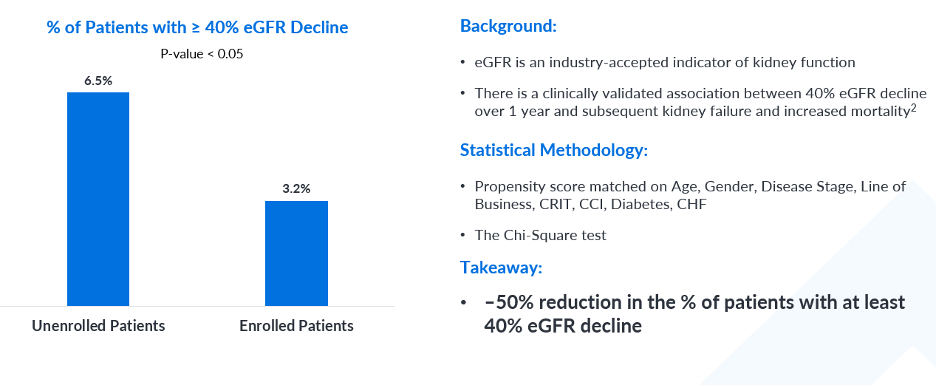Study Demonstrates That Patients in Value-Based Care Models Are Less Likely to Experience Significant Declines in Kidney Function
Authors : Joanne Chen, Ph.D. and Mohammadreza Faraji, Ph.D.The current standard of kidney care focuses on providing treatment for patients after their kidneys have already failed. It’s a case of too little, too late, and results in high costs and high health care utilization since transplantation and dialysis are often the only options for end-stage disease. Value-based kidney care programs, such as those from companies like Strive Health, are determined to change the paradigm by supporting and treating patients with chronic kidney disease earlier, prioritizing the right care at the right time and driving better outcomes, all while lowering costs.
Through partnerships with commercial and Medicare Advantage payors, Medicare, health systems and physicians, Strive Health serves more than 73,000 patients in 30 states, providing preventative, holistic and individualized care. Strive believes that early intervention and preventative care are essential in managing and slowing the progression of kidney disease and reducing costs. Consider that for commercially insured members, costs increase exponentially with each disease stage progression, according to an analysis by the American Journal of Managed Care.
“There is no question that the way kidney disease care has been delivered for the past 30 years is broken,” said Renee George, SVP, Strive Market Operations. “The incentives have not been in the right place. Across the board the focus has been on end-stage disease and dialysis and not as much on preventing people from moving to dialysis. It’s important to us to impact how care is delivered. We see that as the number of patients we are engaging grows, we are delaying disease progression and improving care for patients with kidney disease.”
If we can prevent patients from advancing in their disease, we’ll be able to curb the need for hospitalizations and other high-cost care. We’ll also improve quality of life for our patients. Strive Health is already achieving some early success in helping patients avoid expensive and often unnecessary care. To truly demonstrate the value of this approach, we must also show that an emphasis on early intervention has impacted disease progression from a clinical perspective. One recent Strive study does just that.
Research
In a recent year-long study of Strive patients with chronic kidney disease (CKD) and a group of comparable patients (i.e., propensity score matched on a variety of factors) not enrolled in Strive’s program, fewer Strive patients showed serious disease progression than their counterparts. Tracking a standard clinical measure for kidney function (i.e., eGFR decline), the study found that twice as many non-Strive patients experienced a drastic decline in kidney function within 12 months. In comparison, most of the Strive patient group remained stable. The difference is statistically significant.
Just 3.2% of the Strive patients reached a significant decline in kidney function after 12 months. In comparison, more than double in the baseline group experienced a major decline (see chart below). The study indicates that the Strive Health care model delays late-stage CKD progression. When kidney function declines rapidly, patients are at higher risk to progress to end-stage kidney disease (ESKD), which typically leads to higher healthcare costs.

“The message from this study is clear. If you enroll in the Strive program, there is a lower possibility that your kidney function will decline,” said nephrologist Bhargavi Degapudi, MD. “Strive’s efforts to identify at-risk patients earlier and intervene with support and treatment is helping to protect kidney function.”
Analysis
In Strive’s view, this early study shows that the company’s care model is having an impact on improving disease outcomes. There are three key factors in this model that Strive believes are positively influencing disease progression:
• Risk stratification: Risk stratification is the process of categorizing patients by their health status and directing care and support based on the healthcare needs of that population. Strive created its own risk stratification model specifically designed for kidney patients that leverages a variety of information, including medical conditions, medications, lab results, healthcare usage, behavioral health, demographics and social determinants of health. Strive takes the process one step further by incorporating proprietary models that support deep insights into kidney patient data profiles.
• CareMultiplier™: CareMultiplier™ is Strive Health’s proprietary data tool. Powered by machine-learning algorithms, CareMultiplier™ makes sense of massive amounts of data, providing valuable insights to care teams. This technology offers Strive Health providers easy access to information used to develop individualized care plans tailored to patients’ needs and the potential to intervene before costly events, such as unplanned ER visits, occur. For example, through data and insights provided by CareMultiplier™ and other sources, clinicians can assess patients at risk of potentially “crashing” into ESKD and proactively engage them. CareMultiplier™ empowers providers and enables them to spend more time interacting with and treating patients, which aids the process of slowing disease progression.
• High-touch care: Holistic, comprehensive, patient-centered care is at the heart of the Strive Health model. Instead of exclusively focusing on clinical kidney care, Strive builds well-rounded programs that manage co-morbidities and close care gaps, while ensuring effective and custom-tailored access to mental health support, lifestyle advice and caregiver assistance. Strive Kidney Heroes™ – a multi-disciplinary team consisting of nurse practitioners, nurses, social workers, care coordinators and dietitians – play a critical role in delivering personalized care. The team not only addresses clinical barriers to care, but also non-clinical challenges for CKD patients such as lack of education, food insecurity, transportation problems and other issues that can prevent patients from accessing care. In addition, Strive offers a range of flexible options to improve access to care, including telehealth, house calls and 24/7 access to a nurse. The Kidney Heroes™ also help keep communication flowing between patients and nephrologists, to ensure that everyone involved in the care of a patient has the information needed to achieve the best possible health outcomes.
Conclusion
While further study is needed and underway, early research shows that Strive’s model is positively impacting disease progression. If we can prevent CKD patients from advancing in their disease, we’ll reduce the need for expensive and invasive treatments and improve the quality of life for our patients in the process.
References:
- https://cdn.sanity.io/files/0vv8moc6/ajmc/0f8966a35bc03a51a1cd4b289efa4ad76adb6ab2.pdf/AJMC_A777_06_2017_CKD__WEB.pdf
- Lesley A. Inker, Hiddo J. Lambers Heerspink, Hasi Mondal, Christopher H. Schmid, Hocine Tighiouart, Farzad Noubary, Josef Coresh, Tom Greene, and Andrew S. Levey, GFR Decline as an Alternative End Point to Kidney Failure in Clinical Trials: A Meta-analysis of Treatment Effects From 37 Randomized Trials, American Journal of Kidney Diseases 2014; 64(6): 848-859








